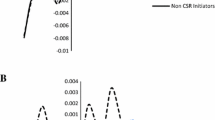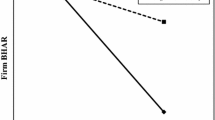Abstract
The pressure on companies to practice corporate social responsibility (CSR) has gained momentum in recent times as a means of sustaining competitive advantage in business. The pharmaceutical industry has been acutely affected by this trend. While pharmaceutical product recalls have become rampant and increased dramatically in recent years, no comprehensive study has been conducted to study the effects of announcements of recalls on the shareholder returns of pharmaceutical companies. As product recalls could significantly damage a company’s reputation, profitability and brand integrity, this paper investigates the effect on shareholder wealth and the extent to which the adoption of CSR practices by pharmaceutical companies in the United Kingdom (U.K.) and the United States (U.S.), the two largest markets for pharmaceutical products in the world, affected market reactions surrounding product recall announcements. The analysis of product recall announcements from 1998 to 2004 compiled from The Pharmaceutical Journal and U.S. Food and Drug Administration enforcement reports revealed marked differences in the way market participants in the two countries responded to news of product recalls. U.S. investors penalised firms according to the severity of product defects while U.K. investors were indifferent. While U.K. investors rewarded product recalls by firms which were not usually CSR-active, U.S. investors punished non-CSR active firms that performed recalls. These observations could pose strategic challenges to pharmaceutical firms operating in both countries.
Similar content being viewed by others
Abbreviations
- ANOVA:
-
analysis of variance
- CSR:
-
corporate social responsibility
- FDA:
-
United States Food and Drug Administration
- MHRA:
-
Medicines and Healthcare Products Regulatory Agency
References
ABN-AMRO Sector Report: 2004, http://www.unepfi. org/fileadmindocuments/materiality1/pharma_abnam ro_2004.pdf
Aguilera R. V., Williams C. A., Conley J. M. and Rupp D. E. (2006) Corporate Governance and Social Responsibility: A Comparative Analysis of the UK and US. Corporate Governance and Social Responsibility 14(3):147–158
Ahmed P., Gardella J. and Nanda S. (2002) Wealth Effect of Drug Withdrawals on Firms and their Competitors. Financial Management 31(3):21–41
Alexander G. J. and Buchholz R. A. (1978) Research Notes: Corporate Social Responsibility and Stock Market Performance. Academy of Management Journal 21(3):479–486
Barber B. M. and Darrough M. N. (1996) Product Reliability and Firm Value: The Experience of American and Japanese Automakers, 1979–1992. The Journal of Political Economy 104(5):1084–2000
Baron D. (2001) Private Politics, Corporate Social Responsibility and Integrated Strategy. Journal of Economics and Management Strategy 10:7–45
Binay M. (2005) Performance Attribution of US Institutional Investors. Financial Management 34(2):127–152
Black B. S. and Coffee J. C. (1994) Hail Britannia?: Institutional Investor Behaviour Under Limited Regulation. Michigan Law Review, 92:1997–2087
Bromiley P. and Marcus A. (1989) The Deterrent to Dubious Corporate Behaviour: Profitability. Strategic Management Journal 10(2):233–250
Brown, J.: 2000, ‹Managing Corporate Reputation’ from Turnbull, Internal Control and Wider Aspects of Risk, Association of Chartered Certified Accountants, http: //www.acca.org.uk/pdfs/environment/turnbull.pdf
CDER Report to the Nation: 2004, http://www.fda. gov/cder/reports/rtn/2004/rtn2004–4.htm # Recalls
Clark-Murphy M., Soutar G. (2005) Individual Investor Preferences: A Segmentation Analysis. Journal of Behavioural Finance 6(4):6–14
CSR Europe: 2006, CSR Facts and Figures, http://www.csreurope.org/aboutus/CSRfactsandfigures_page 397.aspx.
Davidson W. N. and Worrell D. L. (1988) The Impact of Announcements of Corporate Illegalities on Shareholder Returns. Academy of Management Journal 31(1):195–200
Davidson W. N. and Worrell D. L. (1992) Research Notes and Communications: The Effect of Product Recall Announcements on Shareholder Wealth. Strategic Management Journal 13(6):467–473
De George R. T. (2005) Intellectual Property and Pharmaceutical Drugs: An Ethical Analysis. Business Ethics Quarterly 15(4):549–575
Dickinson J. G. (2001) Most Recalls due to FDA Inspection Findings. Medical Marketing and Media 36(5):30
Donaldson L., Davis J. H. (1991) Stewardship Theory or Agency Theory: CEO Governance and Shareholder Returns. Australian Journal of Management 16:49–64
Donaldson T., Preston L. (1995) The Stakeholder Theory of the Corporation: Concepts, Evidence, and Implications. Academy of Management Review 20:65–91
Dowdell T. D., Govindaraj S. and Jain P. C. (1992) The Tylenol Incident, Ensuing Regulation and Stock Prices. Journal of Financial and Quantitative Analysis 27:283–301
Dow Jones Sustainability website, http://www.sustai nability-indexes.com
Dranove D. and Olsen C. (1994) The Economic Side Effects of Dangerous Drug Announcements. Journal of Law and Economics 37(2):323–348
Freeman R. E. (1984) Strategic Management: A Stakeholder Perspective. Prentice Hall, Englewood Cliffs, NJ
Friedman, M.: 1970, ‘The Social Responsibility of Business is to Increase its Profits’, The New York Times Magazine, September, 13, p. 33
Frooman J. (1997) Socially Irresponsible and Illegal Behaviour and Shareholder Wealth. Business and Society 36(3):221–249
FTSE4Good website, http://www.ftse.com/ftse4good
Garriga E. and Mele D. (2004) Corporate Social Responsibility Theories: Mapping the Territory. Journal of Business Ethics 53:51–71
Harper J. T., Madurab J. and Schnusenberg O. (2006) Performance Comparison between Exchange-Traded Funds and Closed-End Country Funds. Journal of International Financial Markets, Institutions and Money 16:104–122
Hart S. (1995) A Natural Resource Based View of the Firm. Academy of Management Review 20:986–1014
Hartman R. S. (1987) Product Quality and Market Efficiency: The Effect of Product Recalls on Resale Prices and Firm Valuation. Review of Economics and Statistics 69:367–372
Hoffer, G. E., S. W. Pruitt and R. J. Reilly: 1987, ‹Automotive Recalls and Informational Efficiency’, The Financial Review 22(4), 433–441
Hoffer G. E., Pruitt S. W. and Reilly R. J. (1988) The Impact of Product Recalls on the Wealth of Sellers: A Reexamination. The Journal of Political Economy 96(3):663–670
House of Commons Health Committee: 2005, The Influence of the Pharmaceutical Industry – Fourth Report of Session 2004–05, Vol. I (London, The Stationery Office Limited)
IMS Health: 2005, IMS Health Forecasts 6 to 7 Percent Growth for Global Pharmaceutical Market in 2006, http://www.imshealth.com/ims/portal/front/articleC/0,2777, 6599_3665_75719589,00.html
Jarrell G. and Peltzman S. (1985) The Impact of Product Recalls and the Wealth of Sellers. Journal of Political Economy 93(3):512–536
Kuk G., Fokeer S. and Hung W. T. (2005) Strategic Formulation and Communication of Corporate Environmental Policy Statements: UK Firms’ Perspective. Journal of Business Ethics 58:375–385
Law, R.: 2003, ‹Natural Justice?’, The Independent, New Zealand, http://members.iimetro.com.au/∼hubbaca/public_html/pan.htm
Leisinger K. M. (2005) The Corporate Social Responsibility of the Pharmaceutical Industry: Idealism Without Illusion and Realism Without Resignation. Business Ethics Quarterly 15(4):577–594
Levitt, T.: 1958, ‘The Dangers of Social Responsibility’. Harvard Business Review, September-October, pp. 41–50
Mallin C., Mullineux A. and Wihlborg C. (2005) The Financial Sector and Corporate Governance: The UK Case. Corporate Governance: An International Review 13(4):532–541
Marcus R. D., Swindler S. and Zivney T. L. (1987) An Explanation of Why Shareholders’ Losses are so Large After Drug Recalls. Managerial and Decision Economcis 8(14):295–300
Marquez A. and Fombrun C. J. (2005) Measuring Corporate Social Responsibility. Corporate Reputation Review 7(4):304–308
McLachlan J., Gardner J. (2004) A Comparison of Socially Responsible and Conventional Investors. Journal of Business Ethics 52:11–25
McWilliams A. and Siegel D. (2001) Corporate Social Responsibility: A Theory of the Firm Perspective. Academy of Management Review 26(1):117–127
McWilliams A., Siegel D. S. and Wright P. M. (2006) Corporate Social Responsibility: Strategic Implications. Journal of Management Studies 43:1–18
Medicines and Healthcare Products Regulatory Agency: 2004, A Guide to Defective Medicinal Products, 1 January 2004, http://www.mhra.gov.uk/home/groups/is-md/documents/publication/con007572.pdf
Michelson G., Wailes N., van der Laan S., Frost G. (2004) Ethical Investment Processes and Outcomes. Journal of Business Ethics 52:1–10
Moskowitz M. (1972) Choosing Socially Responsible Stocks. Business and Society Review 1:71–75
Pruitt S. and Peterson D. R. (1986) Security Price Reactions Around Product Recall Announcements. Journal of Financial Research 9(2):113–122
Rao S. and Hamilton J. B. (1996) The Effect of Published Reports of Unethical Conduct on Stock Prices. Journal of Business Ethics 15(12):1321–1330
Salin V. and Hooker N. H. (2001) Stock Market Reaction to Food Recalls. Review of Agricultural Economics 23(1):33–46
Schueth S. (2003) Socially Responsible Investing in the United States. Journal of Business Ethics 43:189–194
Solomon A., Solomon J. and Suto M. (2004) Can the UK Experience Provide Lessons for the Evolution of SRI in Japan?. Corporate Governance: An International Review 12(4):552–566
Sparkes R., Cowton C. J. (2004) The Maturing of Socially Responsible Investment: A Review of the Developing Link with Corporate Social Responsibility. Journal of Business Ethics 52:45–57
The Association of the British Pharmaceutical Industry: 1994, Batch Recall of Pharmaceutical Products, 2nd edn. Association of the British Pharmaceutical Industry, London
The Pharmaceutical Journal Online – Product Recalls and Drug Alerts, http://www.pjonline.com/recalls
Thomsen M. R. and McKenzie A. M. (2001) Market Incentives for Safe Foods: An Examination of Shareholder Losses from Meat and Poultry Recalls. American Journal of Agricultural Economics 82(3):526–538
US Food and Drug Administration (FDA) Enforcement Report Index website, http://www.fda.gov/opacom/Enforce.html
US Food and Drug Administration (FDA): 2002, FDA Recall Policies, June 2002, http://www.cfsan.fda.gov/∼lrd/recall2.html
Vance S. (1975) Are Socially Responsible Corporations Good Investment Risks?. Management Review 68(8):18–24
Wall Street Journal: 2006, Business and Finance, April 12, 2006, p. A1
Werhane P. H. and Gorman M. (2005) Intellectual Property Rights, Moral Imagination, and Access to Life-Enhancing Drugs. Business Ethics Quarterly 15(4):595–613
Williams, G. A.: 2005, ‘Some Determinants of the Socially Responsible Investment Decision: A Cross Country Study’, http://papers.ssrn.com/sol3/papers.cfm?abstr- act_id=905189
Wingfield J., Bissell P., Anderson C. (2004) The Scope of Pharmacy Ethics - An Evaluation of the International Research Literature: 1990–2002. Social Science and Medicine 58:2383–2396
Wynne A. J. and Hoffer G. E. (1976) Auto Recalls: Do They Affect Market Share?. Applied Economics 8:157–163
Yaros R. S. and Wood D. F. (1979) Recalling Products in the Drug and Cosmetic Industry. Journal of Business Logistics 1(2):48–59
Acknowledgements
Parts of this paper were presented at the `Corporate Social Responsibility Agendas for Asia' conference held in Kuala Lumpur, Malaysia on 13 and 14 April 2006, organized by the International Centre for Corporate Social Responsibility, Nottingham University Business School. The authors would like to thank two anonymous reviewers for their valuable insights.
Author information
Authors and Affiliations
Corresponding author
Additional information
Jeremy Cheah is an Assistant Professor of Finance at Nottingham University Business School, Malaysia Campus. His research interests lie in the area of applied corporate finance and investment management.
Wen Li Chan was an Advocate and Solicitor in Kuala Lumpur, Malaysia before assuming the post of University Teacher in Information Systems and Strategy at Nottingham University Business School, Malaysia Campus. She is currently investigating the roles and implications of information on firm valuation, particularly in the area of corporate cyber-litigation and corporate social responsibility.
Corinne Chieng is a Corporate Executive at Star Publications (M) Berhad, Malaysia. She has previously worked as a tax consultant at Arthur Andersen Malaysia. Her research interests include the financial implications of corporate social responsibility on the valuation of firms.
Rights and permissions
About this article
Cite this article
Cheah, E.T., Chan, W.L. & Chieng, C.L.L. The Corporate Social Responsibility of Pharmaceutical Product Recalls: An Empirical Examination of U.S. and U.K. Markets. J Bus Ethics 76, 427–449 (2007). https://doi.org/10.1007/s10551-006-9292-1
Received:
Accepted:
Published:
Issue Date:
DOI: https://doi.org/10.1007/s10551-006-9292-1




